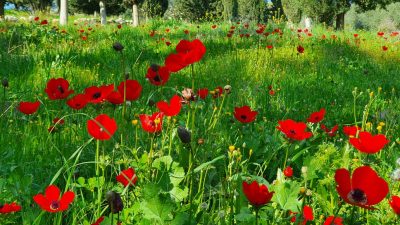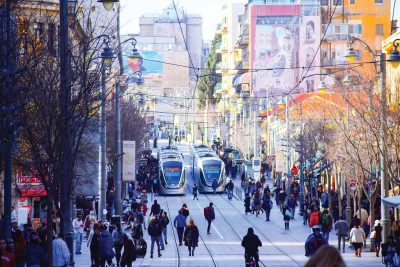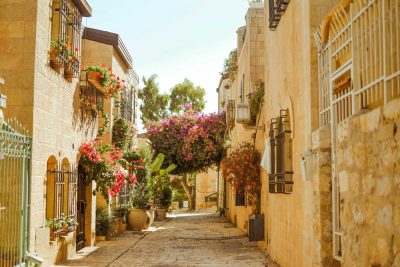
by: Kate Norman, BFP Staff Writer
 In conversations outside the Holy Land, I’ve found that much of what people assume about Israel is incorrect, mostly because they have never had the opportunity to visit. Until tourism resumes and people can come experience this amazing country for themselves, I’m here to set the record straight on a few misconceptions.
In conversations outside the Holy Land, I’ve found that much of what people assume about Israel is incorrect, mostly because they have never had the opportunity to visit. Until tourism resumes and people can come experience this amazing country for themselves, I’m here to set the record straight on a few misconceptions.
Sure, southern Israel boasts a desert with rich, red rock that resembles Mars, but this nation has so much more to offer. If you were properly motivated, you could go skiing and surfing in one day in Israel. For such a small nation, most people are blown away by the Jewish state’s diverse climates and terrains: lush, green forests; pristine beaches with crystal clear water and palm trees; rolling pastoral hills, perfect pastureland for grazing flocks, and yes, even a ski resort on Mount Hermon near the northern border. This land really does have it all.
Israelis have an opinion and aren’t afraid to let you know what they think—a simple fact that deferential Westerners often don’t know what to make of at first. But their unabashed honesty comes from the best of intentions. In fact, native Israelis are nicknamed sabras: cacti that are prickly on the outside but sweet on the inside. If an Israeli is sharing an honest opinion with you, they are doing so for what they believe is your own good. On the flip side, most Israelis view the propensity in other cultures for tiptoeing around uncomfortable topics instead of sharing their true opinion as standoffish.
 3. Israelis travel around on camels and donkeys
3. Israelis travel around on camels and donkeysFun as that sounds, most Israelis travel in cars or using the nation’s primo public transportation system, which includes buses, Jerusalem’s light rail and several train lines that make inner and intercity travel quick and convenient. Tel Aviv also boasts a system that lets users rent electric scooters and bicycles by the hour to travel the city. Sure, you can visit Bedouin camps that offer camel rides to tourists, but most Israelis opt for modern motor travel.
Blondes, brunettes, redheads, purpleheads, you’ll see it all here: tall, Scandinavian-looking people with blonde hair and blue eyes; short people with olive skin and dark hair; and everything in between. After their ancient exile by the Roman empire and subsequent spread across the globe, these people are extremely diverse. And each day, more and more Jewish people around the world are making aliyah (immigrating to Israel), adding to its already colorful array of people and cultures.
 Despite the media portraying the Jewish state as a violent land plagued by rocket explosions and terror attacks, Israel boasts a crime rate lower than most Western nations. Don’t be afraid to visit this land and see for yourself how safe and enjoyable it is. Hike through forests and camp on national trails, float in the Dead Sea, pray at the Western Wall, wander through the cobblestoned alleyways of Jerusalem’s Old City, climb the red rocks of Israel’s Timna Park. Experience and see everything, interact with the locals, and walk away with the experience of a lifetime.
Despite the media portraying the Jewish state as a violent land plagued by rocket explosions and terror attacks, Israel boasts a crime rate lower than most Western nations. Don’t be afraid to visit this land and see for yourself how safe and enjoyable it is. Hike through forests and camp on national trails, float in the Dead Sea, pray at the Western Wall, wander through the cobblestoned alleyways of Jerusalem’s Old City, climb the red rocks of Israel’s Timna Park. Experience and see everything, interact with the locals, and walk away with the experience of a lifetime.
Israel is diverse, with multiple cultures and people groups living and blending in a small nation. And if you ask Israelis their opinion about people of a different religion, you’ll hear this popular answer: “Each person should live according to his own faith”—a paraphrase of Habakkuk 2:4. Israel’s population reflects that. Yes, the Jewish state is predominantly Jewish, but of the over 9 million residents of Israel, 6.87 million (74%) are Jews and nearly 2 million (21%) are Arabs, according to Israel’s Central Bureau of Statistics. And not all Arabs are Muslim, either. There are significant minority populations of Christian Arabs, particularly in Bethlehem and Nazareth. The other 5% of the population includes minorities such as international Christians and Druze.
Speaking of that Jewish 74% of the population—don’t assume that means they all look and dress alike. Just as there are hundreds of streams and denominations of Christianity, there are hundreds of streams of Judaism. That ranges from conservative, ultra-Orthodox Jews who sport modest, dark clothing, to Orthodox Jewish men who sport the kippah (skullcap) and tzitzit (tassels) and married women who wear headdresses, to secular—even agnostic or Atheist—people who do not practice the Jewish religion but are Jewish nonetheless.
 8. People in Israel live in mud huts or tents
8. People in Israel live in mud huts or tentsThe tent part is true only during Sukkot (Feast of Tabernacles), the biblical feast in which the Jewish people erect tents for a week to commemorate their 40 years wandering the wilderness. But the modern-day Israelis have come a long way from their tent-dwelling roots, living in contemporary homes. In Jerusalem, people live in beautiful apartments tucked inside Jerusalem stone. In Tel Aviv, they live in modern, stylish apartments. In other parts of the country, they live in comfortable houses with stucco roofs. The housing is as varied as the country, but people here largely live in modest, contemporary dwellings.
Thankfully, no. After returning to their homeland from ancient exile around the globe, the Jewish people have brought with them a variety of delightful international dishes. Whatever cuisine you’re hungry for, you’ll find it here—except for a solid New York-style bagel (a very touchy subject here). Hummus is everywhere, yes—and Israel’s hummus is amazing, but this country has so much more to offer: shawarma, falafel, Ethiopian fare, tacos, sushi, fresh-caught Mediterranean seafood, McDonalds, Chicago-style hotdogs, you name it. Trust us, you won’t go hungry here or suffer from a lack of options.
Wrong. Read a book called The Start-up Nation: The Story of Israel’s Economic Miracle. Visit Tel Aviv, the main hub for Israel’s start-up scene, where countless businesses and innovators are housed amid the urban skyline. Read about the amazing research and development being done in Israel’s top-notch universities. See for yourself how this tech-savvy nation is booming for innovation in all areas, including defense, agricultural, medical and green technology.
Israel is a beautiful, diverse land filled with colorful people and cultures that defy expectations—and have a marvelous time doing it.
Photo Credit: Click on photo to see photo credit
All logos and trademarks in this site are property of their respective owner. All other materials are property of Bridges for Peace. Copyright © 2025.
Website Site Design by J-Town Internet Services Ltd. - Based in Jerusalem and Serving the World.